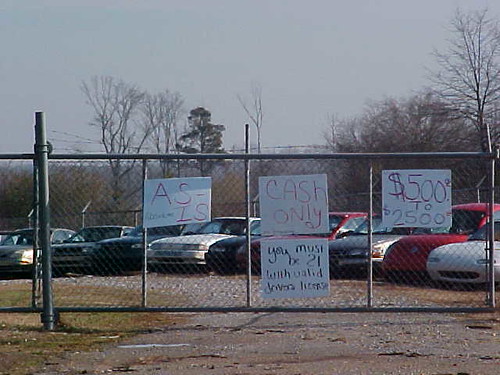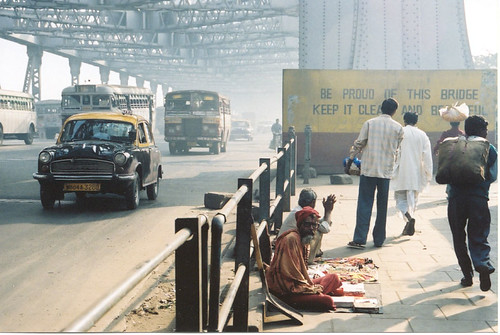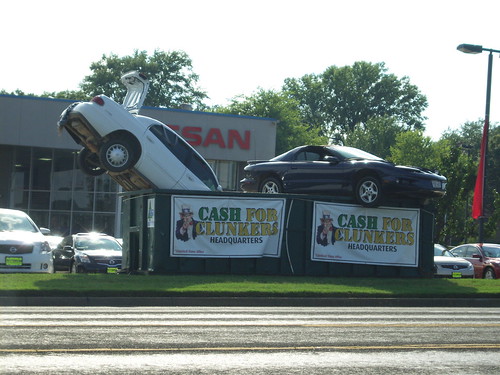Time examines the “Cash for Clunkers” initiative: A Deal to Help Detroit — and the Planet?
(Source: Time)
It’s no secret that one of the biggest reasons the U.S. auto industry is teetering on collapse is that, quite simply, Americans have stopped buying cars. U.S. auto sales were down 37% in March from 2008, the latest in a nearly unbroken year-and-a-half streak of falling sales. And if the cratered economy is the main culprit behind backed-up inventory at U.S. car dealers, another is that American automakers have failed to produce the more fuel-efficient vehicles that gas-price-conscious car buyers are beginning to demand. As a result, the U.S. still sends hundreds of billions of dollars overseas for oil — and adds ever more greenhouse-gas pollution into the atmosphere.
Now what if there were a way to tackle both these problems with one policy: to stimulate demand for American cars while making the U.S. auto fleet cleaner, greener and more efficient? It sounds like the kind of slick two-for-one pitch you might hear from a used-car salesman, but that’s exactly what proponents of a “cash for clunkers” program are promising.
In its broad outlines, the prospective policy — for which a number of proposals have been put forward in Congress — would offer Americans cash rebates of up to several thousand dollars if they traded in an old, inefficient car for a new, greener one. The ailing U.S. automakers would receive a shot in the arm — potentially worth up to 2 million additional sales a year — while polluting cars would be taken off the road and replaced with more efficient ones. (All cash-for-clunkers programs require the old cars to be scrapped rather than resold.) “There are significant environmental advantages and substantive benefits for the auto sector,” says Benjamin Goldstein, a policy analyst for left-leaning think tank the Center for American Progress. “This goes right for the source of the problem, for vehicles sales and for oil use.”
But is cash-for-clunkers really two-for-one? That depends. There are currently two main bills in the House and Senate, which, according to greens, are not created equal. One, sponsored by Democratic Ohio Representative Betty Sutton, allows any car from model year 2000 or earlier to be traded in, without any restriction on fuel economy. In return, car buyers will get $4,000 if they buy a new U.S. car that gets a minimum mileage of 27 m.p.g. and $5,000 if they buy a U.S. car with at least 30 m.p.g. Crucially, the new cars have to be made in the U.S. — foreign brands can qualify, but only if they’re manufactured on U.S. soil, which would disqualify super-efficient vehicles like Toyota’s Prius hybrid, made only in Japan.
Whichever bill is chosen — and others are being circulated as well — a successful cash-for-clunkers program wouldn’t be cheap. Germany’s program may end up costing the government some $6 billion, three times the initial price tag. Since Obama has said that money for the cash-for-clunkers program needs to come out of existing stimulus spending, that might take some creative accounting. But a cash-for-clunkers program, whatever its environmental benefits, would provide the government with a way to aid the domestic auto industry without giving Detroit any more direct handouts. “There’s a lot of justifiable taxpayer reluctance to keep helping the auto industry,” says Goldstein of the Center for American Progress. “Politically this is a viable alternative to sending them additional loan money.”
Note: Below is a list of articles on this issue, previously published on TransportGooru. This compilation of articles offer an insight into state of various “Cash for Clunkers” style programs implemented (or currently being debated) across the globe (Germany, UK, etc,). Stay plugged in to TransportGooru for more on this topic in the days to come.
Consumer Assistance to Recycle and Save (CARS) Act revives “Cash for Clunkers” scrapping plan in U.S
Germany plans to extend Abwrackprämie aka “Environmental Bonus”
The bickering starts over the implementation of the Cash for Clunkers legislation
Obama Favors “Cash for Clunkers”
Britain mulls implementation of “Cash for Clunkers” scheme to boost ailing auto sales
Where the US stands in pushing “Cash for Clunkers”- Four bills in Congress; Details Needed








